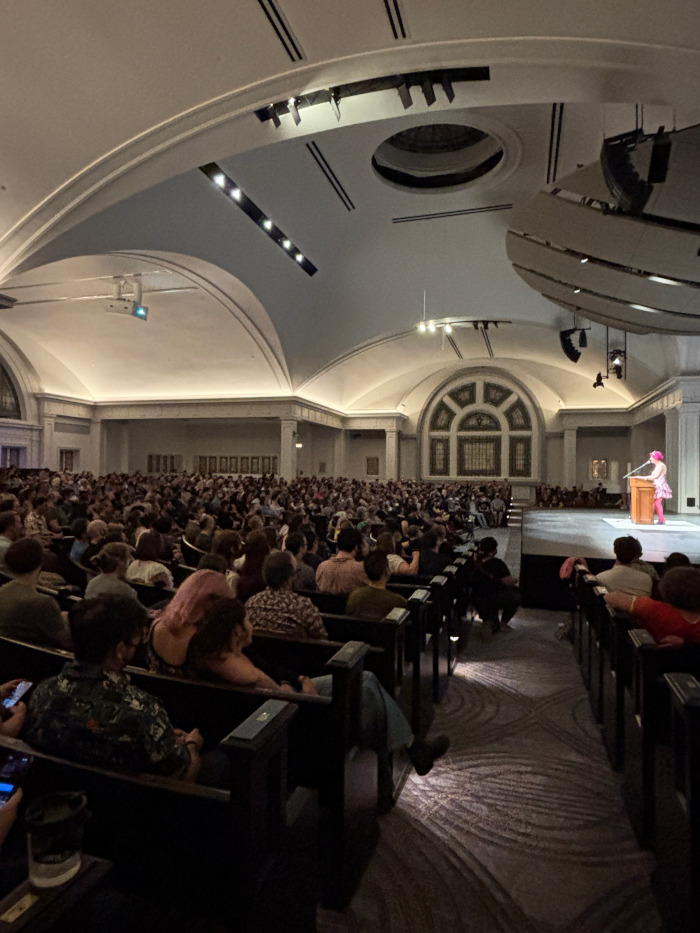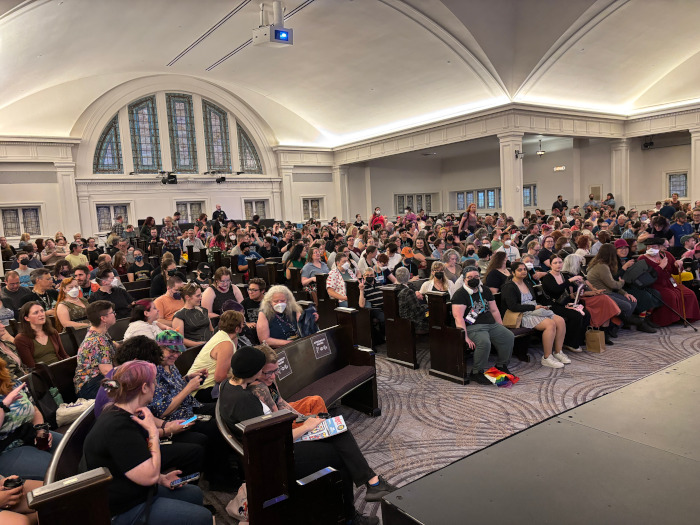There is not just one Worldcon. In Seattle this year, there were 5500 registered attendees plus another 2000 or so bought single-day memberships, meaning there were ~7500 different Worldcons this year.
Worldcon is many things to many people, but the one thing it always is, is an intentional community. It’s an event that happens because people give their time, their energy, their skills, and their care to make it happen.
In this way, Worldcon is, and always has been, what we make of it. It is simultaneously the home of one of our genre’s most important awards, a premiere costuming event, a professional development incubator, a social structure, an important economic opportunity for some, a schmoozefest, and a celebration of all that the science fiction/fantasy genres have to offer. It’s also a microcosm of all the stresses and problems of our society, and really, how could it not be?
For most of Worldcon’s existence, science fiction as a genre and science fiction fandom were marginalized, minimized, and discriminated against. But in the 21st century, science fiction (and fantasy) have become big capitalist business in movies, television, and merchanidizing, and we’ve had two generations now who have grown up with sf/f being mainstream. These days it’s just as normal to see people wearing a T-shirt with Iron Man or Yoda or Hogwarts on it as the Dallas Cowboys or Real Madrid, or Taylor Swift or Kendrick Lamar.
This mainstreaming represents a sea change in the larger society, but it has not actually changed the Worldcon very much. Compare and contrast San Diego Comic Con, which was of similar size to Worldcon in the 1980s, and now tops out at 130,000 attendees because that’s the max attendance their convention center can handle. (See this graph.) As comics and their Hollywood tie-ins have grown to dominate moviemaking, SDCC has been growing more commercial for the past 50 years.
At Worldcon, although there is costuming and gaming and anime, the heart of it is still the literature, the short stories and novels of science fiction and fantasy and the people who write them and publish them, and the people who like to read them. Love of literature is not sufficient to define a community, though: that has taken generations of people defining the con fandom subculture and its traditions, and creating the space for all the sub-sub-subcultures within fandom to meet and co-exist.
I bring this all up as a preamble to my con report, because I think it’s very important for us not to take for granted the communities and institutions like Worldcon, that are built by people for people, and not by corporations for profit, or by governments for politics. This doesn’t mean we shouldn’t ask for things to be better when we feel it’s needed; quite the opposite, an intentional community demands its attendees not be mere passive consumers.
And make no mistake, Worldcon is not a perfect utopia (and if you’ve studied utopian fiction you know that no utopia is perfect, and also one person’s utopia is another person’s dystopia). Someone said to me this year, “Can’t we ever have a Worldcon without a scandal or disaster?” This year there was the ChatGPT programming kerfuffle. Last year the Hugo voting/dossier compiling news broke. In San Diego a guy who got mad about being banned arranged a pro-gun “freedom rally” outside the convention center. The Sad Puppies. The Rabid Puppies. Et cetera.
Which got me thinking… maybe the answer is no, we can’t ever have a Worldcon without some kind of kerfuffle… but maybe that’s not entirely a bad thing? Because Worldcon is ever in the process of becoming itself. Like democracy, it demands participation and it demands argument. And unlike American democracy at the moment, it has proven itself resilient in the face of these challenges. The Puppies were roundly rejected by the voting membership to the Hugos. The gun rally was a complete dud. Unlike the major awards in some other genres (looking at you RWA Ritas), the Hugos still exist and carry on. (There have been other schisms, fights, resignations, and dismissals: do not take the previous list as complete. It is merely a sampling from recent memory.)
But despite the ChatGPT kerfuffle and a few highly questionable panel topics and/or slates, the overall program in Seattle came out looking quite intriguing, thought-provoking, and generally reflective of the sf/f genre’s leanings toward liberal thinking. At least two Hugo award finalists who had inexplicably not been given any programming did get added at the last minute. I do not know whether the programming department proactively took steps to remedy the oversight or if it took various folks prodding and yelling to make it happen. I suppose one of the points I’m making here is that no, it shouldn’t be necessary for folks to prod and yell to get the finalists included in the program, but given that humans are fallible and putting on a Worldcon is a huge group effort, sometimes some prodding or yelling is the only way.
The demographics of Worldcon have changed over the 35+ years I’ve been attending. There are many more visible queer folk than there used to be. Remember when Tor Books ran a “Women of Fantasy” advertising and book tour campaign back in the early 1990s, because it was notable that they had multiple women coming out with fantasy books at the same time? Now that’s simply the norm. Women writing science fiction & fantasy have gone from being a rarity (fewer than 15% of SFWA in 1965) to 35% in 1999 to being slightly more than half of SFWA members right now.
It’s no longer notable if all five panelists on a topic happen to be women, and it’s no longer notable if multiple queer, nonbinary, or trans folk are on a panel that is not about being queer or trans. The genre is no longer as White as it once was, either, with writers of color having pretty well stormed the gates of the award lists. (The whole Sad Puppies campaign was in fact in response to avowed right wing white male writers’ perception that the awards were not being dominated by white male writers anymore. And I kinda think that the Puppies’ attempts to game the nominations not only didn’t work, they accelerated the diversity, because they spurred a lot of folks in the Worldcon community to branch out their reading just to spite them… and people liked what they read.)
However, even with greater diversity among attendees, that doesn’t mean that a Worldcon automatically feels welcoming to everyone. As we know, even some of the most self-proclaimed liberal spaces can still be rife with microaggressions and/or fraught with systemic inequity. But with an intentional community, there is a lot of elasticity for people to make the event what they want of it.
Party!
It’s why for years my preferred method of promoting and selling Circlet Press’s books was to throw parties rather than take a dealer table. It might not have been the most effective way to sell the most books, but it was always the best way for me to bring queer, kinky, and trans erotic sf/f writers together to actually talk with each other. Those are my people, and I made a space for them to gather. This year I threw a Worldcon party for the first time since before COVID. Since I don’t run Circlet Press anymore, I just billed it as Queer Book Party, threw a bunch of pride flags onto the flyers and signs, and threw open my door to see who showed up.
Shortly after the party started, the significant person who showed up was a security guard who told us the hotel would shut us down if they got a second noise complaint about us. I pointed out that it was not yet 10pm, which was when the hotel supposedly would begin enforcing “quiet hours.” The designated party hotel, the Sheraton, had apparently decided the week before the con to decide unilaterally that their previous agreement to allow open parties — and open elevators — every evening actually just meant open elevators from 8-10pm and then all parties should shut down. Many typical worldcon parties run well past midnight and ours couldn’t even open until 9pm because I had a reading scheduled at 8:00. Ultimately we were able to keep the noise down enough that we did not get shut down and I had to regretfully kick folks out at 1:30 AM so I could get some sleep!
This was not the worst party-hotel fail we’ve ever experienced at a Worldcon, though. That would have been Montreal, where the designated party hotel was the Delta, and it had not only our party and many others, but the official Con Suite. We opened our party around 8pm that time and for the first hour or so we had great traffic and a lively crowd. But then it slowed to nothing. We were just down the hall from the Con Suite, and no one was in there, either. I went down to the lobby to try to see what was going on, only to discover that hotel security had decided NO ONE who wasn’t a registered guest of that hotel would be allowed upstairs and they were checking keys. About a thousand people who were NOT staying there, but who all had invitations to parties there, were milling around the lobby hoping someone would talk some sense into the hotel. (I don’t think anyone ever did. Montreal 2027 conrunners, please take note.)
One thing Seattle Worldcon did extremely well was with their art, graphic design, and signage. The signage was plentiful, informative, and necessary, given the immense size of the convention center. The designs were delightful to look at as well as readable. I also really appreciated that with such an immense convention center, there were able to dedicate space for lounges and safe spaces for various groups. I availed myself of the LGBTQ one at one point to meet up with someone, and there was also a dedicated press room, which was a good, quiet place to record an interview. (Looking forward to another article on Worldcon by Chaitna Deshmuk in The UW Daily.)
Writing Workshop
My one piece of “official” Worldcon programming this year was I taught a 2.5 hour workshop on Writing A Sex Scene. Cat Rambo put together a track of writing workshops and it was great to have the time to do a deep dive on my favorite topic. The room was packed when I arrived. I’m not sure exactly how many it was, but I think the room seated 50 people? Every seat was taken, and I gave a couple of chairs from the head table to a couple of stragglers. I think it went really well overall and I’m grateful people felt comfortable enough to read some samples of the little exercises we did aloud in front of the group. Here’s hoping some of those snippets turn into some fantastic stories!
This year the two biggest highlights of my con were both “fringe” events, events created by people who saw a need and made them happen adjacent to the Worldcon.
ConCurrent
The first was ConCurrent, the brainchild of Mia Tsai, who was in a group of authors online griping with one another about the apparent mess in the Worldcon programming department that had led them to disastrously use ChatGPT to vet program participants (and by disastrously I mean it prompted some award finalists to withdraw from consideration, some conrunners to resign in disgust, some attendees to boycott, and a massive social media outcry). ChatGPT is notoriously biased against BIPOC and queer people, which led Mia, egged on by several of us in the online gripe session, to do something concrete to counteract the possibility of that bias and make a statement against AI by programming an alternative event.
ConCurrent took over the ACT Theater, located closer to the main con hotel (the Sheraton) than the convention center itself, and put on a full day of panels featuring almost exclusively BIPOC panelists, with a few exceptions.
Here’s a photo of the panel on the movie Sinners, since I didn’t manage to get a photo of my own panel, which was on Erotica & Horror. Pictured are LD Lewis (Moderator), Christopher Caldwell, LP Kindred, Rebecca Roanhorse, Erin Roberts, and Nicole Glover.
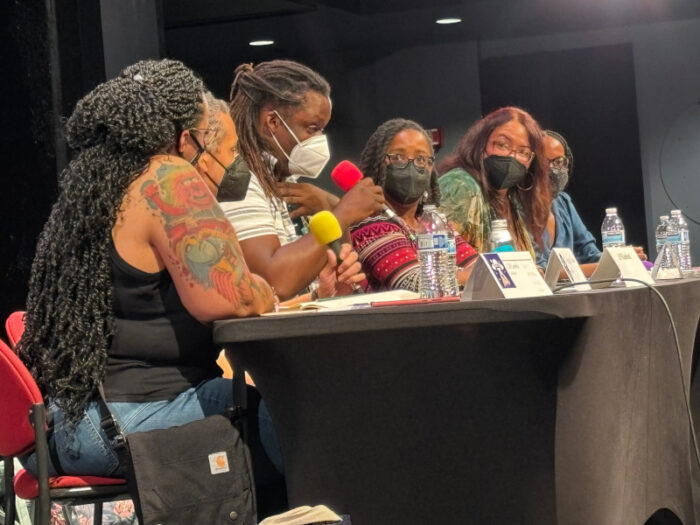
Update! Here’s a photo of the Erotica & Horror panel from the ConCurrent instagram:
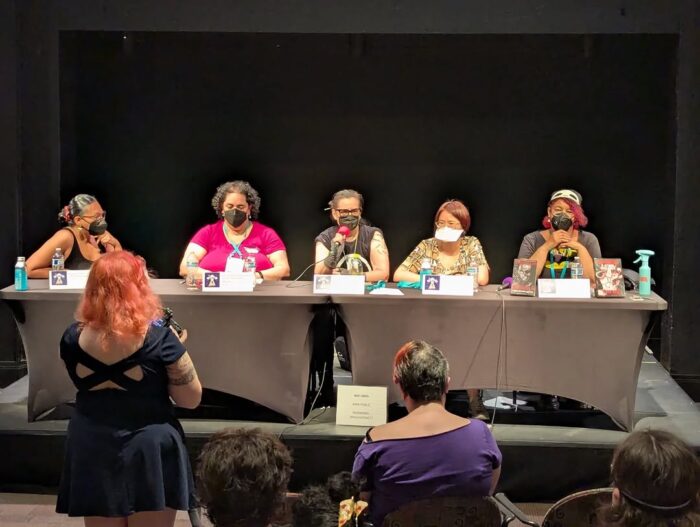
Moderator ML Krishnan, Coral Alejandra Moore, Cecilia Tan (me), Diana Pho, Sumiko Saulson.
Also in this photo, Lauren Ring (with camera) who took many photos for ConCurrent and I will include more of them below.
I was the one who proposed the Erotica & Horror topic, and some might note it’s the same topic as a Readercon panel I did, but the conversation came out so completely different with a different set of panelists! ML Krishnan was a terrific moderator who herded us cats into some interesting directions.
At ConCurrent, we dug down into how there are different subgenres of horror and how various subgenres might allow you to fulfill both the requirements of horror and of erotica within the same story. For example, if you’re writing body horror, can you use the contrast between the parts of the story that are erotic and the horrific to magnify the horror rather than conflating the two? Back in the 90s there was a kind of moment for erotic horror that most of us felt was very sex negative — where the sex WAS the horror, and there was still a lot of shame and revulsion built in.
There’s also redemptive horror, which often opens the door for a romance-style happy ending, since some of the characters do defeat evil and survive in the end (just not everyone…) There was universal agreement that we’d like to do away with the old horror trope that anyone who has sex gets killed and instead have the sexy-times remain as a positive force in the story. This panel left me hopeful that we can use horror as a narrative tool — dark days require dark fiction sometimes — and yet still include positive sexual experiences for our characters and readers, especially when portraying queer, trans, or kinky characters.
Writers with Drinks
Then that evening came Writers with Drinks.
Charlie Jane Anders has been curating a reading series called Writers With Drinks for over 20 years now, and I’ve read at WWD both in Cambridge and San Francisco. Usually WWD is in a bar or nightclub (hence the “drinks” portion of the theme), but in Seattle the venue was a gorgeous theater called Town Hall that was formerly a Christian Science church. I mean, look how gorgeous:
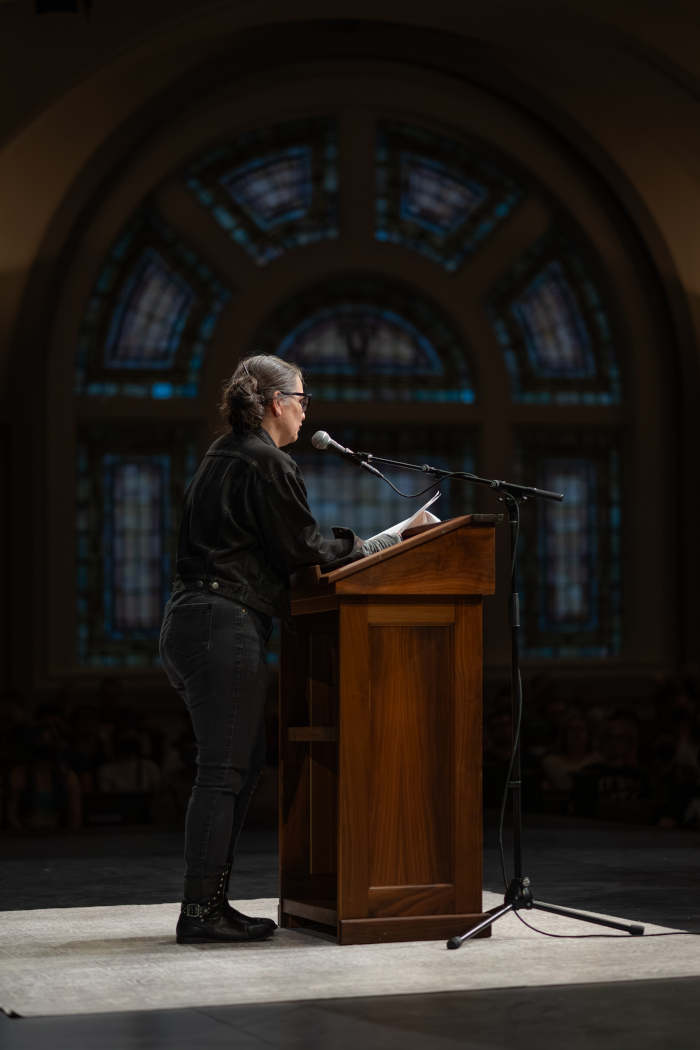
That’s me, captured by photographer @jo.goeswandering in the Great Hall, reading to an audience of over 700 attendees. A completely RAPT audience, I must add. They hung on every word. And all the readings were so terrific! The evening was billed as “Superstars of Queer SF”. Charlie Jane’s new book, Lessons in Magic and Disaster, just launched, and Annalee Newitz is also on book tour for Automatic Noodle. They both read from those books.
I had seen Annalee earlier in the week at Third Place Books in Lake Forest, Washington, and after hearing them speak about robot civil rights and noodles, I bought the book and had already finished reading it two days later. (They also gave a great recommendation for biang biang noodles in Seattle, Taste of Xi’an in the U District, and corwin and I ate there one night.) Automatic Noodle follows the principle of take everything you love and jam-pack it into a book. Every page is delightful.
Also on the slate were Andrea Hairston, Darcie Little Badger, and Becky Chambers. Andrea is a longtime theater person who is always a dynamic reader, and Darcie read from an absolutely entrancing story that had appeared in Sunday Morning Transport: “Those Hitchhiking Kids.”
Coincidentally, the story I read an excerpt from at WWD, “Large Emotional Models,” will be coming up in Sunday Morning Transport in just a few weeks! If you’d like to read my story, you can subscribe to SMT for free to get one free story per month, or use this “friends and family” link to get a 60 day free trial for the tier that gets you a story every week: https://www.sundaymorningtransport.com/smt2024
It’s a story about academia, and Prince, and David Bowie, and broken hearts, and AI, and encounters with the ineffable. Oh, and self-acceptance.
Becky Chambers closed the evening with a novel excerpt that was also an extended meditation on love and connection and how important they are to human life.
Connection and community is ultimately what a Worldcon is all about. I’m planning to be in LA next year. Probably will throw a party, maybe two? How about you?
—
(And now the promised picspam)
More from ConCurrent:
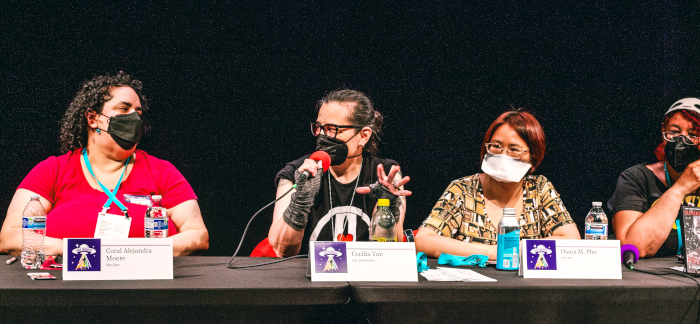
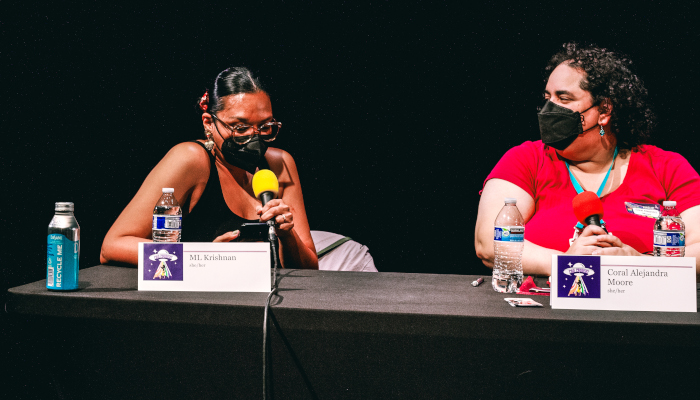
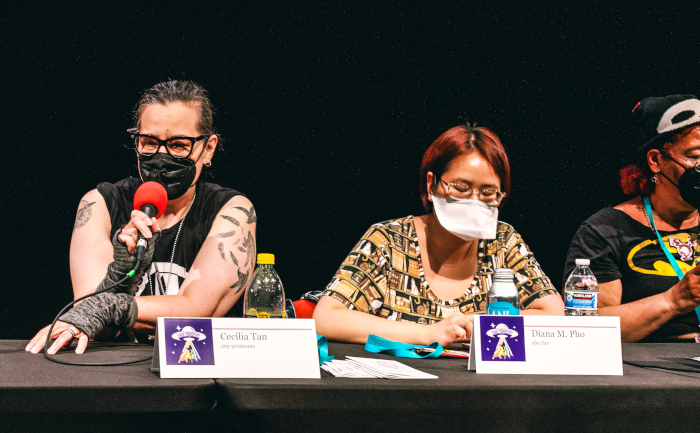
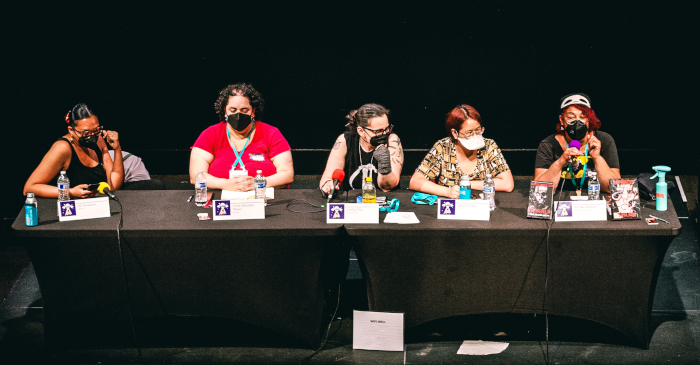
More from Writers with Drinks:
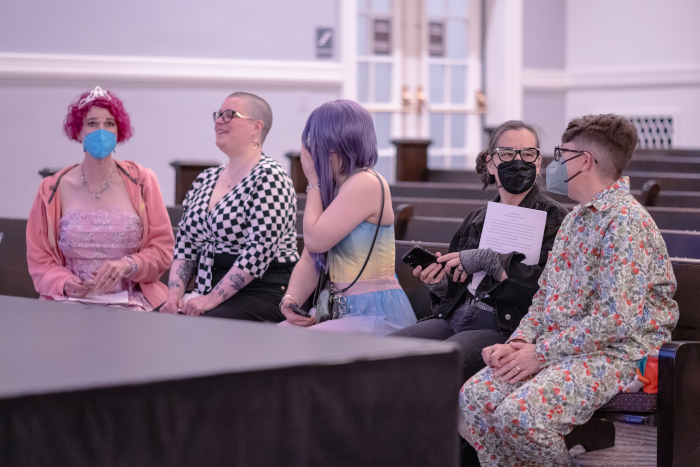
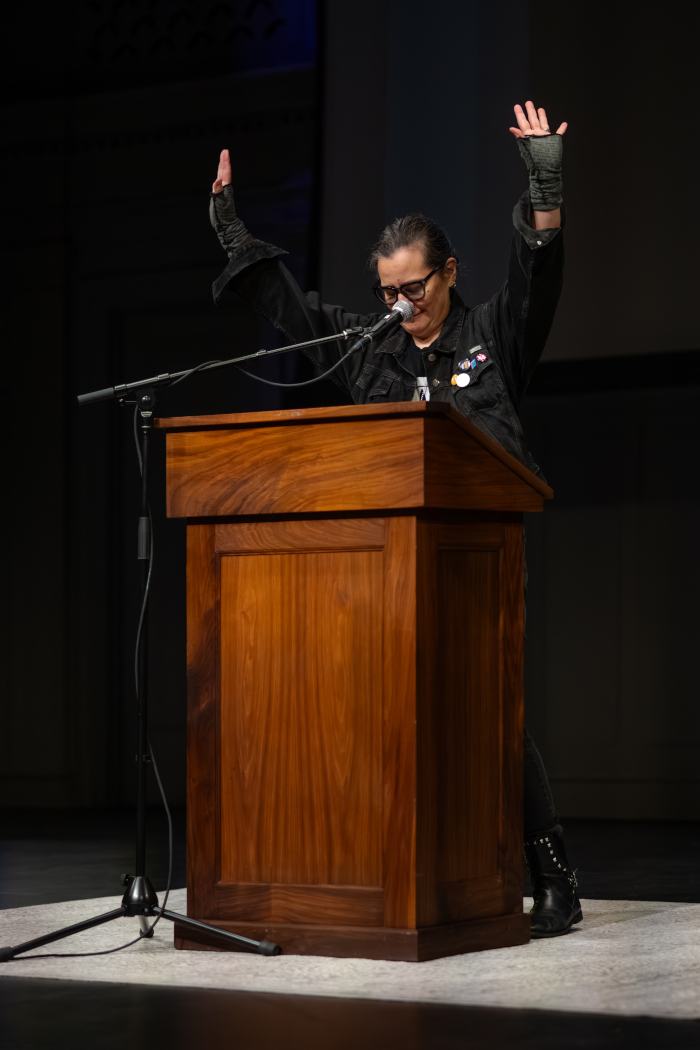
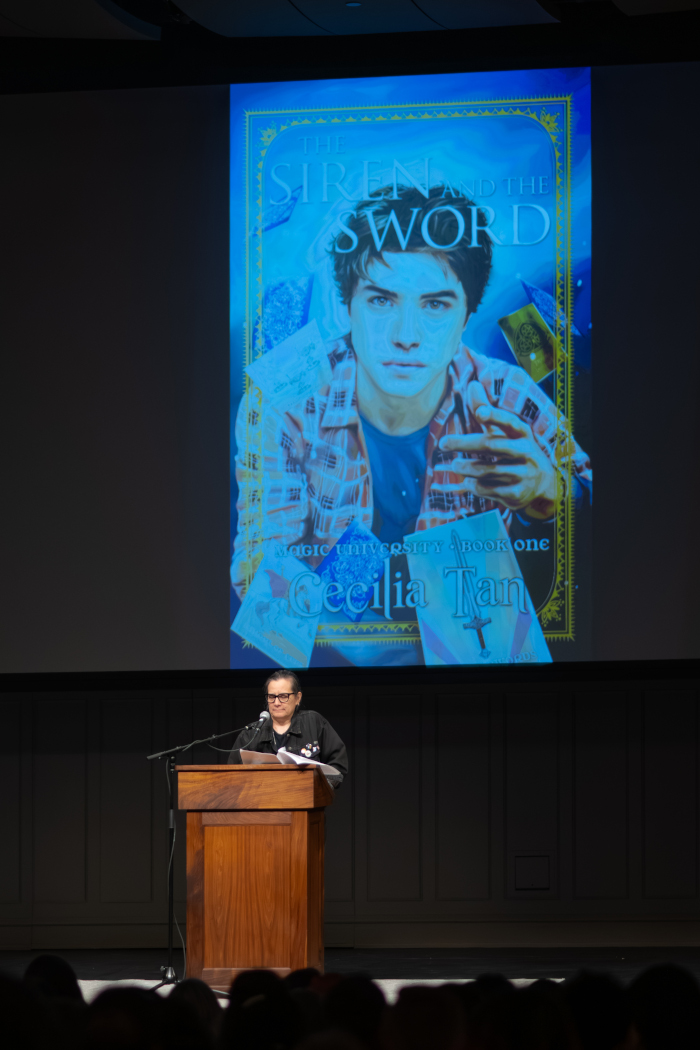
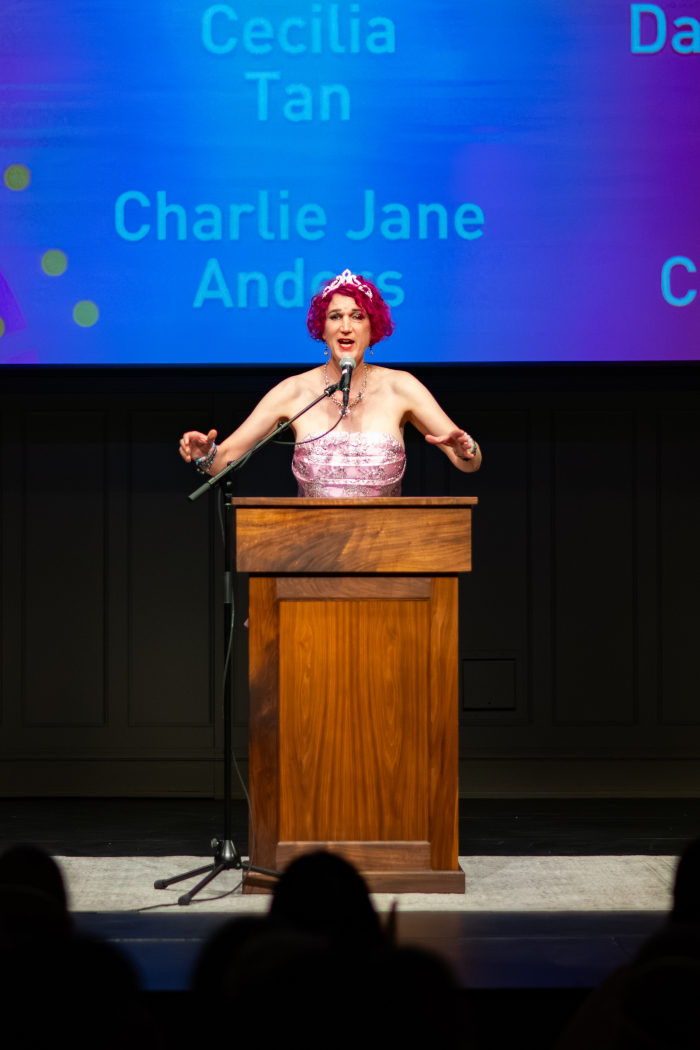
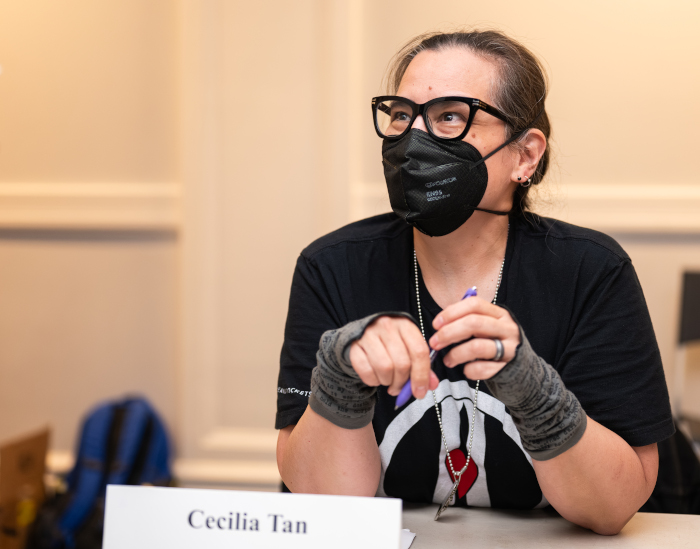
Some crowd shots I took showing the immense audience:
